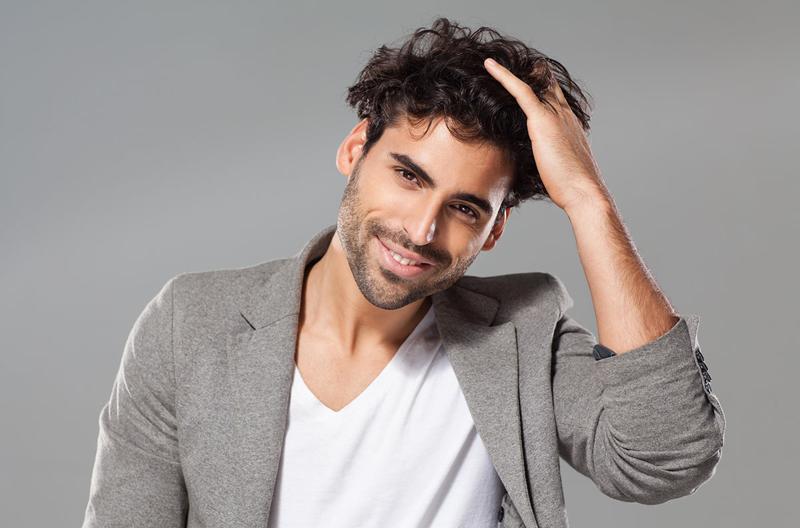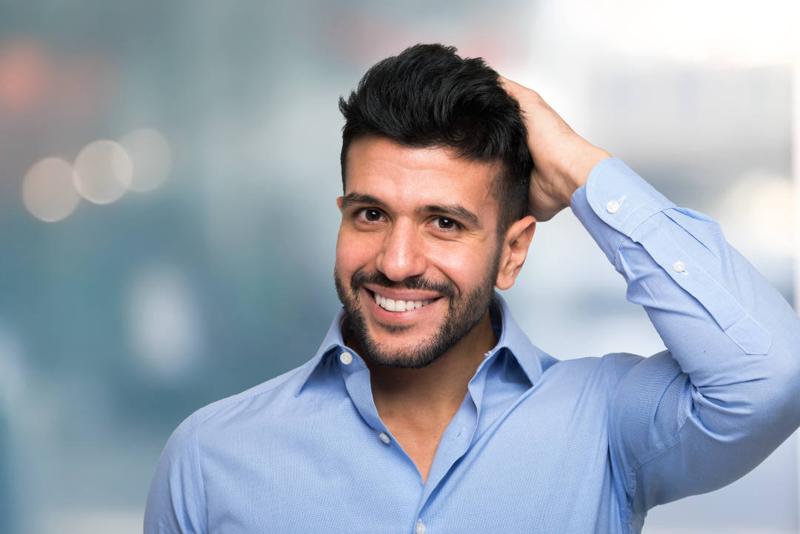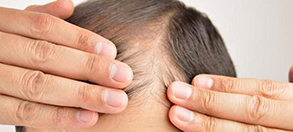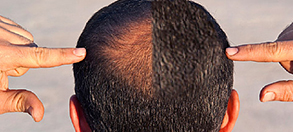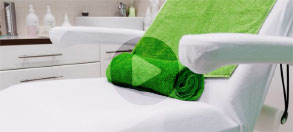Non-surgical hair restoration is a category of medical-grade treatments designed to help individuals experiencing hair loss or thinning. These procedures utilize various non-surgical hair restoration procedures and techniques that do not involve surgery to stimulate hair growth, improve hair density, mitigate hair loss, and restore confidence. If you have noticed a receding hairline, thinning hair, or bald patches, and if you wish to control hair loss and restore your hair growth without undergoing surgery, non-surgical hair restoration may be an effective solution for you.
The team of hair restoration specialists at Houston Hair Transplant Center (HHTC) is well-versed in both surgical and non-surgical hair restoration procedures and hair loss treatments, and their expertise has helped thousands of patients address their hair loss and rejuvenate their hair and scalps with healthy, natural hair regrowth.
If you are interested in exploring non-surgical hair restoration options, we recommend that you reach out to schedule a complimentary consultation with Dr. Jezic and our clinicians. You can reach us by submitting our online contact form. If you have any questions or would prefer to schedule an appointment over the phone, please feel free to call our Houston office directly at (713) 864-2300.
Contents
- 1 About Non-Surgical Hair Restoration
- 2 Benefits
- 3 Candidates
- 4 Personal Consultation
- 5 Preparation
- 6 Treatment Options
- 7 Recovery
- 8 Results
- 9 Corresponding Procedures
- 10 Cost of Non-Surgical Hair Restoration Treatments in Houston
- 11 FAQ
- 11.1 What causes hair loss?
- 11.2 Are the results of non-surgical hair restoration permanent?
- 11.3 Can I combine non-surgical hair restoration treatments?
- 11.4 Are non-surgical hair restoration treatments painful?
- 11.5 How quickly can I return to normal activities after non-surgical hair restoration treatments?
- 12 References
About Non-Surgical Hair Restoration
Many individuals, regardless of age or gender, experience hair loss due to genetics, hormonal changes, stress, environmental factors, and more. People seek non-surgical hair restoration for various reasons, including wanting to regain a more youthful look, enhance their overall appearance, or simply boost their self-esteem.
The scalp consists of multiple layers of tissue and hair follicles, which are responsible for producing hair strands. Each hair follicle goes through a growth cycle consisting of three phases: the anagen phase (growth), the catagen phase (transition), and the telogen phase (rest). Non-surgical hair restoration targets these hair follicles to encourage new growth and improve the existing hair’s thickness and quality.
Benefits
Non-surgical hair restoration treatments and procedures offer numerous advantages for patients seeking a less invasive yet effective way to improve their natural hair growth. Under the guidance of the HHTC clinical team led by Dr. Jezic, a dual board-certified hair restoration physician, patients often see benefits such as:
- Non-invasive treatment: Unlike surgical procedures, non-surgical hair restoration solutions do not require incisions, leading to reduced discomfort and much quicker recovery times.
- Little to no downtime: You can resume your daily activities immediately after your procedure or treatment without extended periods of recovery.
- Natural-looking results: Treatments aim to blend seamlessly with existing hair, providing a more natural appearance than some surgical methods.
- Customizable options: Multiple treatment methods enable personalized treatments that cater to individual needs and preferences.
- Lower costs: Non-surgical treatments typically cost less than hair transplant surgeries, making them more accessible.
- Safe and effective techniques: Advanced hair restoration techniques, especially ACP and LLLT, have proven safe with minimal side effects when performed by experienced hair restoration specialists and trichologists.
- Easy to repeat and incorporate: Procedures can be repeated as needed to maintain results without major commitments.
- Boosted self-esteem: Improved hair quality and density can significantly enhance one’s self-image and confidence.
Candidates
Candidacy for non-surgical hair restoration treatments is open to any man or woman who is concerned about hair loss or thinning, bald spots, or any other form of hair loss due to genetic factors, aging, hormonal changes, or stress. However, each individual’s unique condition should be analyzed by a hair restoration specialist at HHTC before embarking on a treatment plan. Ideal candidates are those who have a healthy scalp without any infections, possess realistic expectations regarding treatment outcomes, are willing to commit to and follow a treatment plan, and prefer non-surgical methods over surgical hair restoration.
Personal Consultation
Your journey toward non-surgical hair restoration begins with a personalized consultation with Dr. Jezic or our hair restoration specialists. During this complimentary session, we will review your medical history, assess your hair loss condition and patterns, and discuss your hair restoration goals and concerns. Our clinical team will evaluate factors such as the extent of hair loss, the health of your hair follicles, and your scalp health to recommend an appropriate course of action.
This important meeting also allows patients to ask questions, understand the benefits and risks of selected treatments, and ensure they are comfortable with their chosen path.
Schedule your consultation today to begin exploring your hair restoration options. You can reach us by submitting our online contact form, or you can call our Houston office directly at (713) 864-2300.
Preparation
As a non-surgical procedure, patients do not have to follow rigorous preparation plans before beginning their hair restoration treatment. However, there may be some key guidelines to follow. Patients may be asked to cease blood-thinning medications or supplements and avoid or decrease alcohol consumption. Patients who smoke may also be asked to quit to promote better healing. During your consultation with our clinical team, Dr. Jezic and our clinicians will review your medical history and the underlying issues surrounding your hair loss, and even discuss your hair grooming routines. From here, you will receive recommendations on how to best prepare for incorporating your hair restoration treatments into your daily life. Do not stop any medications unless specifically instructed by the doctor.
Treatment Options
There are multiple non-surgical hair restoration treatment options available to patients, and many of these can be performed simultaneously to produce optimal effects.
Autologous Conditioned Plasma (ACP)
Autologous conditioned plasma, or ACP, is a specialized serum that harnesses the healing effects of your own blood and plasma to prolong the growth cycles of hair follicles by facilitating the release of hormones and growth factors. (1) In these treatments, we will draw a sample of your blood and process it to raise the concentrations of platelets in the plasma matrix. Once this is created, we will strategically inject this into your scalp. After three to six months of consistent treatment, patients can see significant hair regrowth. (2)
Laser Cap
The Laser Cap is a wearable device outfitted with red LED lights that promote hair growth through low-level light therapy, or LLLT. These treatments rely on an effect called photobiomodulation, which is when certain light wavelengths encourage cellular activity. (3) As cellular activity increases, more hair follicles are produced, thus encouraging hair growth. (3) For the best results, most patients are recommended to wear their laser devices for at least 30 minutes every other day, though our clinical team may make other recommendations depending on your circumstances.
Cellular Therapy
Dr. Jezic and his clinicians offer cellular procedures that leverage both autologous and allogenic tissue to stimulate hair growth and control hair loss. These injectable procedures are performed under local or topical anesthesia with minimal downtime and little or no discomfort. These procedures are also highly effective for female hair loss and work very well for men as well, particularly when combined with a hair transplant.
Compounds and Serums
Topical compounds and serums are mainstays of non-surgical hair restoration, the most popular of these being Minoxidil (Rogaine) and Finasteride. Minoxidil was originally developed as a high blood pressure treatment, but its impact on hair growth has made it one of the leading hair growth medications. It works by increasing blood flow to the scalp, allowing more oxygen and nutrients to reach the follicles. (4)
Finasteride facilitates hair growth by preventing testosterone from converting to dihydrotestosterone, which is the main hormone responsible for hair loss. (5) Both of these medications are available as either topical compounds or oral medications.
Furthermore, HHTC offers a topical compound that combines minoxidil and finasteride with biotin, caffeine, peptides, and other ingredients. It is our most popular product with a very high renewal rate.
Shampoos and Conditioners
While obviously important for proper hygiene and hair health, shampoos and conditioners are often overlooked elements of hair restoration treatments. Many people may select shampoos that are too abrasive or too cleansing, which can harm developing hair follicles and target important oils on the scalp. Conditioners are important to carefully select as well, as these are vital for giving your hair nutrients and hydration. During your consultation and throughout your treatment, we can recommend science-based, medical-grade shampoos and conditioners that will facilitate healthy hair growth and maintain good hygiene without damaging any new hair follicles or contributing to further hair loss.
Vitamins
Vitamins are vital to hair restoration because they provide the body with the important nutrients it needs to function properly and grow strong, healthy hair. Vitamin dietary supplements contain carefully chosen vitamins, amino acids, nutritionally beneficial herbs and spices, and much more to provide your body with constructive nutrients. During your complimentary consultation, we can recommend vitamins to take each morning or evening.
Recovery
Recovery time for each non-surgical hair restoration method may differ. With non-surgical treatments, patients do not have to take time away from their lives to go through an uncomfortable recovery period. The worst of these recovery symptoms is usually minor swelling or soreness surrounding the ACP injection sites, and this usually resolves in a few hours. Patients may feel some itching as their hair regrows as well. As long as patients closely follow their recommended treatment plans, they will see results within a few months.
Results
Results from non-surgical hair restoration vary based on individual factors and selected treatments. Patients may begin to see hair regrowth within several weeks after procedures like ACP therapy, cellular treatments, topical compounds, and LLLT. Topical, oral, or injectable minoxidil results may take 4 to 6 months of consistent use to show significant results. It is essential to follow the provider’s recommendations to maximize results and maintain ongoing hair health.
Corresponding Procedures
Despite being effective for numerous patients, not all individuals will see the results they desire from non-surgical hair restoration. For these cases, our clinical team will often recommend undergoing hair transplantation through follicular unit extraction (FUE), also known as follicular unit excision. In these procedures, hair follicles are harvested from the back of the head and transplanted into areas of thinning on the scalp. The hair is taken from the back of the head because these hair follicles are resistant to the hair-thinning effects of DHT.
Cost of Non-Surgical Hair Restoration Treatments in Houston
After you meet with our clinical team to discuss your issues and goals, you will receive a comprehensive price estimate. Schedule your consultation today to begin exploring your hair restoration options. If you have any questions, please do not hesitate to call us at (713) 864-2300.
FAQ
What causes hair loss?
Hair loss can result from genetics, hormonal changes, nutritional deficiencies, stress, underlying health conditions, and environmental factors.
Are the results of non-surgical hair restoration permanent?
While some results can last long-term, maintenance treatments may be necessary depending on the procedure and the patient’s individual circumstances.
Can I combine non-surgical hair restoration treatments?
Yes, many patients benefit from combining various methods, such as ACP therapy, cellular treatments, laser hair therapy, and topical minoxidil for enhanced results.
Are non-surgical hair restoration treatments painful?
Most non-surgical procedures are considered minimally invasive and manageable with a mild local anesthetic if necessary. Most patients report little to no pain post-treatment.
How quickly can I return to normal activities after non-surgical hair restoration treatments?
Most patients can return to their usual activities almost immediately after non-surgical hair restoration treatments, with minimal to no downtime required.
References
- Cervelli V, Garcovich S, Bielli A, et al. The Effect of Autologous Activated Platelet Rich Plasma (AA-PRP) Injection on Pattern Hair Loss: Clinical and Histomorphometric Evaluation. BioMed Research International. 2014;2014:1-9. doi:https://doi.org/10.1155/2014/760709
- Hetz SP, Martin J, Pototschnig H. Patient Satisfaction and Clinical Effects of Platelet-Rich Plasma on Pattern Hair Loss in Male and Female Patients. Cureus. Published online September 5, 2022. doi:https://doi.org/10.7759/cureus.28801
- Pillai J, Mysore V. Role of low-level light therapy (LLLT) in androgenetic alopecia. Journal of Cutaneous and Aesthetic Surgery. 2021;14(4):385. doi:https://doi.org/10.4103/jcas.jcas_218_20
- Badri T, Nessel TA, Kumar D D. Minoxidil. PubMed. Published 2020. https://www.ncbi.nlm.nih.gov/books/NBK482378/
- Zito PM, Bistas KG, Syed K. Finasteride. PubMed. Published 2021. https://www.ncbi.nlm.nih.gov/books/NBK513329/
